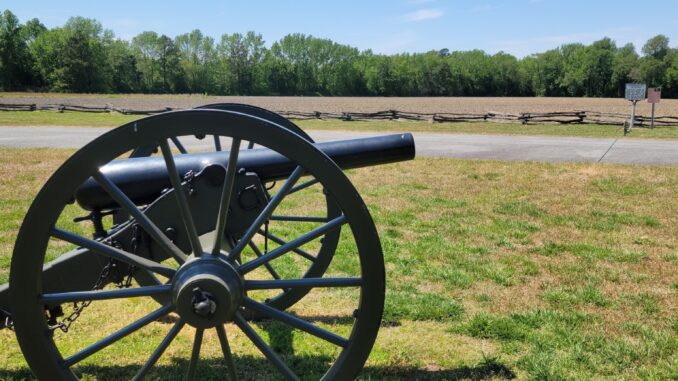
America’s historic battlefields, when preserved and restored to their wartime appearance, possess a tranquil solemnity that belies the fierce combat that once transpired at these hallowed sites. In the face of their picturesque beauty, it can be easily forgotten that battlefields are also cemeteries where the remains of the fallen often still rest.
As students of history, we have long known that lost warriors are out there, but a trio of recent discoveries is a poignant reminder of this phenomenon. Earlier this month, 14 dead from the 1780 Battle of Camden in South Carolina — Patriots, a Loyalist and a British Regular alike — were honored with a military tribute during a moving ceremony on the battlefield. In March, a Civil War burial trench from the 1862 Battle of Williamsburg, Virginia, was inadvertently unearthed. And last summer, researchers in New Jersey announced they had located the remains of several Revolutionary War Hessian soldiers at what had been Fort Mercer on the banks of the Delaware River.
Fifteen years ago, a similar discovery occurred at North Carolina’s Bentonville Battlefield State Park, where ground-penetrating radar investigations, coupled with photographic sleuthing, located 20 long-lost individual burials of unknown soldiers in neat rows. In 2011, each one received an individual headstone, along with appropriate interpretive markers, ensuring their memory was kept alive.
The nature of war has always necessitated that armies hastily bury their fallen on the battlefields, with bodies often moved only a handful of feet apart to be interred with others who fell nearby. In the wake of the Civil War, massive efforts sought to repatriate remains closer to home or family, or to centralized cemeteries where the unknown dead could be appropriately honored. National cemeteries at New Bern, Raleigh and Wilmington were the result of this work. Such efforts, however, are inherently imperfect and even the most comprehensive and well-intentioned process has left some behind.
When we walk a battlefield, often together with our colleagues at the American Battlefield Trust, we make a point to remember these men, buried in unmarked graves lost to history, as well as the grieving loved ones they left behind. When the Trust protects hallowed ground, we are doing it for more than the sake of the history that unfolded there. We are also safeguarding these soldiers’ final resting places and ensuring they are not subjected to unintentional disrespect.
On two of the locations where graves were recently discovered, the Trust has previously been able to protect historically significant land, and it is a source of great pride that we have made a difference at those solemn battlefields. We have now preserved 56,000 acres in 25 states, including more than 2,000 acres at Bentonville — the largest battle ever fought on North Carolina soil.
Much of the progress made to protect North Carolina’s battlefields has been the result of a partnership between the Trust and the State of North Carolina, leveraging federal and state preservation dollars with charitable donations from Trust members. At Bentonville alone, this partnership has taken a 156-acre park and grown it more than 12 times over, creating a heritage tourism destination that draws 60,000 people every year.
Despite this progress, more critical battlefield land — more hallowed ground potentially home to more burials — remains threatened. With America’s 250th anniversary on the horizon, there is no better time for the state to invest in its battlefield parks and historic sites — places such as Averasboro, Bentonville, Fort Fisher, Guilford Courthouse, Moore’s Creek, New Bern, Wyse Fork and others from across the sweep of our nation’s history. By working together to respect the past — and those who gave their lives and remain interred on that land — we also invest in the future.
Kirk Bradley of Sanford is chairman emeritus of the American Battlefield Trust. Charlie Trefzger of Hickory is a member of the American Battlefield Trust Board of Trustees.

